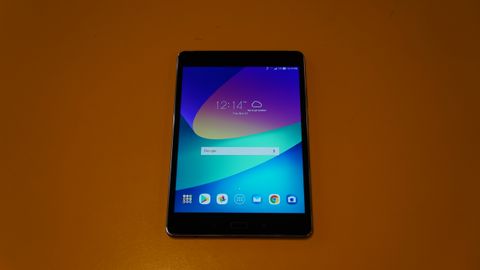TechRadar Verdict
The Asus ZenPad Z8S isn’t a killer tablet, but it comes at a decent price for an LTE-capable option with a high-resolution screen.
Pros
- +
Fair price
- +
Chic, light design
- +
Fun camera filters
Cons
- -
Underwhelming rear camera
- -
Occasional slow performance
- -
Modern video doesn't fit the screen nicely
Why you can trust TechRadar
The Asus ZenPad Z8S is a Verizon exclusive tablet running Android 7.0 with a $249 price tag, or $99 on a two-year contract. The price of this tablet is easy to digest, and makes the device’s few drawbacks a bit more palatable.
We’ve seen the release of solid Android tablets slow to a crawl compared to a few years ago, but Asus’ latest is proof that some companies are still committed to the form factor.
Design
The Asus ZenPad Z8S’s design is sleek, with a smooth metal frame that feels great on the fingers. It houses a bright, 7.9-inch IPS display with a sharp resolution of 1,536 x 2,048. The screen has thin bezels on the sides and larger bezels at the top and bottom. The metal frame blends seamlessly with the back, which is also all metal with the exception of a glossy strip at the top that houses the rear camera.



The volume and power buttons are on the righthand side of the tablet, easily within reach when holding the tablet like a book. Below the screen, there are capacitive Back and Recent Apps buttons and a physical Home button that sadly has no fingerprint scanner built in. The bottom of the tablet features a 3.5mm headphone jack and stereo speakers on each side of a USB-C charging port.
The tablet’s construction feels solid and good in the hand. And, at just 306 grams, we found it fairly easy to hold in one hand. However, one-handed is just about out of the question, especially because the slim bezels on the sides of the screen make it easy to accidentally touch the screen.
There are also some drawbacks to Asus’ design choices with the screen. The aspect ratio doesn’t play nicely with a lot of modern video content, so just about everything is displayed in a letterbox. And, because it’s not an OLED display, the black pixels of the letterbox give off a faint glow, marring cinematic experiences. Also, the “anti-fingerprint coating” on the display didn’t prove to be a match for our fingers.
Features and performance
The Asus ZenPad Z8S features a Snapdragon 652 Octa-core chipset with an Adreno 510 GPU, 3GB of RAM, and 16GB of internal storage expandable to 128GB via a microSD card.
The ZenPad Z8S’s performance is generally passable, but not extraordinary. In our testing, it ran most things well, though we did experience slow-downs, occasional delayed response, and dropped framerates in games. The lag is most noticeable while opening the app drawer, Recent Apps or waking the device up. Basically, it seems to struggle with changes to onscreen content. Most of the time it runs smoothly, but the little hiccups are noticeable. Oddly, the default Asus keyboard doesn’t play too nicely with the processor, and feels clunky, but that was nothing a switch to Google’s Gboard couldn’t resolve.
On top of Android 7.0 Nougat, Asus runs its ZenUI 4.0, which is very blue and bubbly (i.e. icons and buttons are generally round or rounded.) Luckily, this UI doesn’t appear to hinder the performance of the device. And, as far as pre-installed software goes, the ZenPad Z8S has very little, almost none of which could be deemed bloatware.
Powering the ZenPad Z8S is a 4,680mAh battery that can keep that tablet running for a good while. In our Full HD video playback test, the ZenPad Z8S battery drained from 100% to 72% after 90 minutes with the radios on and screen at full brightness. It should be easy to get over 6 hours of video playback from the device with smart battery-saving practices. Unfortunately, once the battery is drained, it doesn’t charge fast, even though the Snapdragon 652 chipset supports Quick Charge. In our test, it took close to 3 hours for the ZenPad Z8S to charge from 0% to 100% while powered down. The first 30% of charge took 45 minutes.
The stereo speakers on the ZenPad Z8S have a clean sound to them, and could stay clean even boosted up to a high volume. The placement of them doesn’t help much when watching shows or movies in landscape view though, as they’ll both be firing out the side.









As far as cameras go, the Asus ZenPad Z8S doesn’t have anything very exceptional. The 5MP front-facing camera is decently sharp, and features some fun filters that can be used in both pictures and Full HD video. The rear camera features those same filters and a few other settings, but proves to be a lackluster main camera. Noise showed up in pictures well before the scenery became what we’d consider dim, and the lack of a Pro/Manual mode for the camera made it hard to really control what the ZenPad Z8S camera was doing. And, despite the Snapdragon 652 chipset supporting 4K video recording, the ZenPad Z8S only records at Full HD.
Verdict
The Asus ZenPad Z8S is a pleasing tablet that manages to offer a fairly positive user experience for a $249 device. It doesn’t have the sort of rage-inducing cut corners that can crop up with budget devices, and the inclusion of LTE connectivity really makes it a versatile option.
However, nothing it does is exceptional. The screen is sharp, but not the sharpest, and the unusual aspect ratio and IPS technology don’t help it with media consumption. The processor struggles now and then, but generally stays smooth and rarely hangs up for more than a second. The cameras are fun, but not verging on DSLR-quality in the slightest.
It’s a good tablet, and at $250, good is good enough.
Verizon customers in the market for a tablet with a data connection have a solid option in the Asus ZenPad Z8S, especially thanks to the reduced price with a two-year contract. For $99, there are far tablets out there. And, buying a ZenPad Z8S without data service is effectively paying for a feature that won’t get used.
Over the last several years, Mark has been tasked as a writer, an editor, and a manager, interacting with published content from all angles. He is intimately familiar with the editorial process from the inception of an article idea, through the iterative process, past publishing, and down the road into performance analysis.

